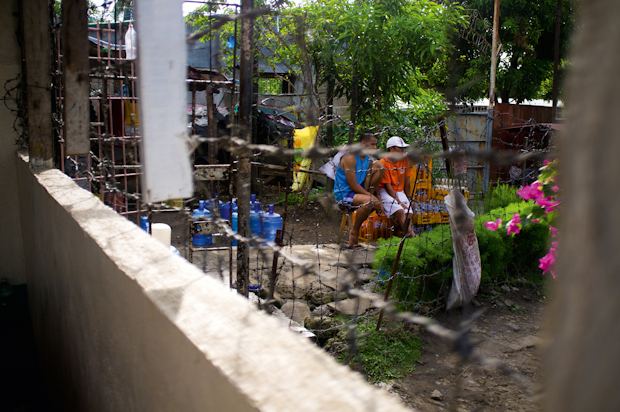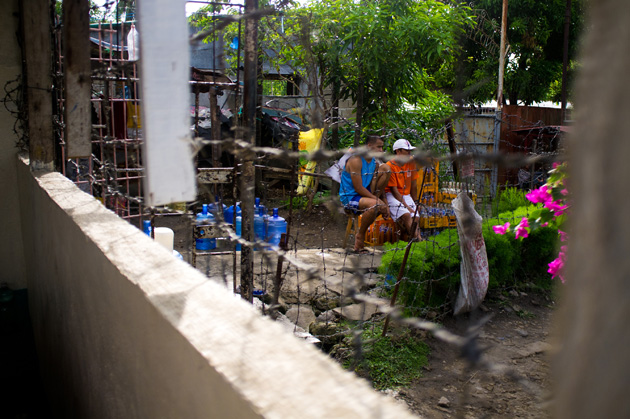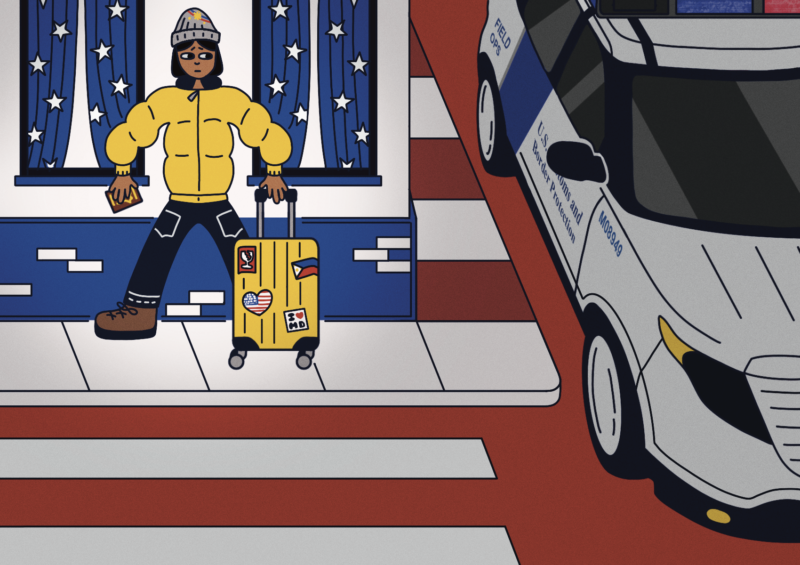
LOCKED UP. Prisoners behind steel bars and barbed wire find themselves trapped in what could be their own personal hell. Photo by Joseph S. Angan
All the things that could be said about hell have already been said. But prison is another matter, one always left for another day—until you’re in it.
In the 2007 movie Selda, a young man (Sid Lucero) recently sentenced for manslaughter is sent into what can only be described as his worst nightmare: cramped living conditions, rampant sexual harassment, and a warden who warns him of what lies ahead. “Hindi ito impyerno, hijo, pero nandito lahat ng demonyo (This isn’t hell, boy, but all the demons are here).”
It’s not the most graphic of warnings, but it might as well be. Despite Ateneans’ desire to be “men and women for others,” the stigma surrounding prison inmates keeps students from extending help to this marginalized group of people. After all, society has literally boxed those behind bars into a distinct stereotype.
Locked up
The usual idea people have of prisoners is that they are violent, uncivilized, and incapable of remorse. The image, perpetuated by media, has taken root and given people cause to fear—or even hate—prisoners. They then think that it’s fair for convicts to be detained in facilities lacking even the bare necessities, such as the country’s main penal institution, the New Bilibid Prison.
The prison facility has not always been in Muntinlupa City. The Carcel y Presidio Correccional, or the Correctional Jail and Military Prison, used to be located on Oroquieta Street in Manila, in line with an 1865 royal decree from Spain. Seventy-five years later, Commonwealth Act No. 67 ordered the construction of a larger prison, and by 1941, the prisoners had been moved into the Muntinlupa facility.
The prison’s location may have changed, but its purpose hasn’t. “The prison is an institution where people are subjected to constant surveillance, rigid systems, rules and regimens,” explains Institute of Social Order (ISO) Director Liza Lim. Control is needed since Bilibid is home to thousands of prisoners whose most common offenses include murder, homicide and rape.
Though not everyone can enter the maximum security compound that houses most prisoners, the medium security compound is a feasible venue for people and organizations to meet and show support for the prisoners. One group in particular, Baliklaya, is found within the halls of Ateneo.
The need for change
Baliklaya has been a constant presence at COA Recweek for the past four years, but few know that its origins lie in another organization. Formerly known as the Legal Management Association of the Ateneo, Ateneo Lex is known for its leadership programs and focus on business, law and ethics. Until several years ago, the Baliklaya Prison Service Program was just a highly commended project, awarded the Most Outstanding Project in the Ateneo Vice President’s Awards for Service and Excellence two years in a row.
Its success led to inevitable change. “It was changing even within Lex,” says Baliklaya President Paolo Luces. “Before, [its mission and vision] was legal, but eventually they added lots of stuff, like exposure trips [and] medical missions.”
Baliklaya has been applying to be an accredited student organization since 2009, now with an advocacy centered on the inviolability of human dignity. During its exposure trips, which are open to non-members, students talk to inmates and interact with them through games (the inmates are particularly good at table tennis) or group dynamics.
Aside from these, Baliklaya has managed projects like legal aid missions (during which lawyers arrive to give advice to inmates) and acting workshops, such as the one given by theater group Entablado last year.
In school, Baliklaya also has pledge weeks, the proceeds of which usually go to T-shirts and uniforms for the inmates, and information seminars. They also have an exhibit showcasing the inmates’ talents.
“[There is] the dancing inmates video,” Luces says, referring to the video released on YouTube early in December. “Others paint. You should see some of their paintings. Ang galing talaga. (They’re really good.)”
Giving prisoners a face
People often stick to their misconceptions until they actually meet prisoners. “The first time I went there, I didn’t know who to talk to or what to talk about,” laughs Luces. “But once you go there, [you think,] ‘This place isn’t so bad.’ They have a college; they have schools.”
He goes on to share about how surprising it was for him to experience meeting an inmate. “You’re going to be the shy one. They’re the talkative ones. You have to be there to know what it feels like,” he explains.
Baliklaya members interact with the Scholastics, a group of inmates at different levels of education. “We [often] meet the same faces, so we really bond,” says Luces. “They remember us. Actually, one of our alumni graduated two years ago but they still remember her.”
One inmate Luces praises warmly is kuya Archie Bueno, who, in April 2012, graduated along with 30 other inmates from the University of Perpetual Help System DALTA (UPHSD), which has an extension campus within Bilibid. Bueno, according to Luces, “knew how to organize the inmates. Nakikinig lahat sila sa kaniya. (Everyone listened to him.)”
Before going to prison, Bueno was a commerce student who had just gotten a scholarship to play on the football team of the University of Santo Tomas. He was arrested for selling drugs and sent to Bilibid, but refused to see it as a setback. He went back to school and graduated as not only the president of the Student Council, but also the chairman of their theater group, captain of their football team (the Bilibid Puzakals), and sports coordinator of the college.
A dose of reality
Unfortunately, life in Bilibid is not without its dangers. On November 16, 2012, a grenade thrown into the maximum security compound injured six people, forcing Justice Secretary Leila de Lima to relieve 140 jail officers of their jobs, reorganize prison supervisors and usher in new efforts to eradicate illegal substance trafficking. The inspection revealed the privileged treatment of the rich and the continuing tension among rival gangs.
Perhaps that’s how some prisoners let off steam. After all, their daily schedule includes exercise, breakfast, work (if any), lunch, more work (or once again, nothing) and then dinner. Meals are cheap, costing around P35 or so, and lack nutrition. Lim adds, “[Others] say that they do not have much to do, so [they] actually go ‘crazy.’”
Their physical conditions aren’t much better. Hygiene is terrible and diseases such as tuberculosis run rampant. “The cells are crowded, with 200 or more people living in a place [made] to house only 30 to 40,” says Lim. “Some have to sleep sitting down. Others go to the bathroom to sleep.”
Such conditions violate the United Nations’ Standard Minimum Rules for the Treatment of Prisoners, which cover prison administration and specifics regarding dealings with inmates, whether ordinary or special ones (such as the mentally ill). The rules emphasize the prisoners’ rights to humane treatment and good lodgings, ensuring that after rehabilitation, inmates return to society in the same shape as before, if not better.
Luces knows the situation and has thought of ways to help, but much of it is out of Baliklaya’s reach. “How do you go about it? You can’t just say, ‘Tara, magtayo tayo ng building. (Come on, let’s construct a building.)’ It’s still under the government.”
However, Baliklaya has had drives for hygiene products and medicine, once even receiving support from the Department of Health. “We sent them letters asking for donations and eventually they gave us a few boxes full of medicine and lotion,” he says.
Stepping out
Though Baliklaya yearns to help in concrete ways, what happens within the prison isn’t within the organization’s control. “Some of the prisoners that I’ve talked to indicate that prison time allowed them to contemplate on their crimes, [and] they vowed that they will not commit the same acts again,” says Lim.
“Others, on the other hand, expressed that they learn more ways of committing crimes in prison. Furthermore, they meet contacts there who put them in contact with other criminals who are still on the loose.”
If Baliklaya wants to make sure that it can help more people, it has to ensure that it will be able to survive as an organization, too. “One of our challenges is trying to find our niche since we don’t have a home course,” says Luces. As an example, he mentions Ateneo Psyche’s link with the Psychology Department, adding, “We’re trying to see which departments and courses [are] very interested [in being] connected to us.”
More than that, though, its members want more students to be aware of what is happening to their countrymen. The stigma surrounding prisoners doesn’t end once the inmates have completed their sentences. “‘Pag malaman ng ibang tao na ex-cons sila (When people find out that they’re ex-cons), they’re still gonna have this bad view [of them],” points out Luces. “Bakit? (Why?) What’s the point of it anyway?”
Lim believes that the best solution to the issues revolving around crime and imprisonment are crime prevention and helping prisoners maintain contact with positive support groups.
Luces agrees. “Prisons aren’t meant to punish, they’re meant to rehabilitate,” he says, dispelling one of the most common notions of jails.
“It’s one of the things we usually forget. People go to prison not to be punished, but to change.”







